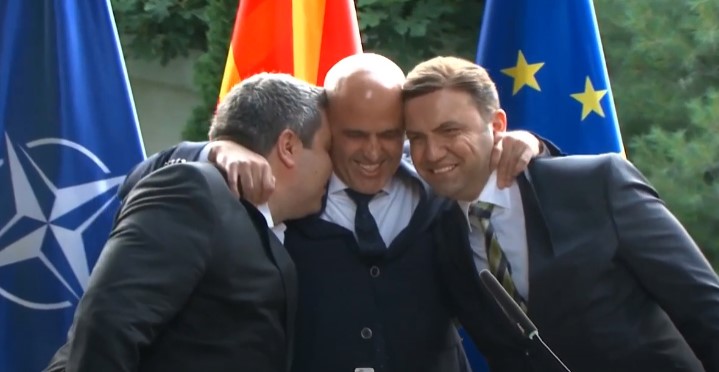The unusual conditions attached to Macedonia’s EU path give rise to concern, writes the Financial Times regarding the Skopje and Tirana’s start of EU accession negotiations.
In 1971, CIA staffers wrote a 12-page document entitled “The Macedonian Syndrome”. Made public 40 years later, it stands the test of time as a pellucid analysis of one of south-eastern Europe’s most intractable historical disputes. Its authors might not be surprised to learn that, despite the different geopolitical context of our times, the tensions over Macedonian identity discussed in the US intelligence agency’s document remain as unresolved today as half a century ago. For these reasons, it is premature to celebrate the EU’s launch this week of the negotiating process by which Macedonia — and Albania — can in principle join the bloc, writes the newspaper.
According to FT, bravely, European leaders responded to Russia’s attack on Ukraine by conferring candidate status last month on Ukraine and Moldova. They also accelerated the process for Macedonia and Albania, lest they be seen to neglect western Balkan states that have been knocking at the door for much of this century. But in their haste to do the right thing, EU leaders have stored up trouble for the future. In essence, they are inviting Macedonia to join but saying this will not happen unless it meets a set of rigorous demands laid out by Bulgaria, its neighbour. These relate primarily to language, national identity and history.
Moreover, the newspaper writes that at any step of the entry talks, Bulgaria has the power to halt or delay them by stating that Macedonia is evading its obligations. Bulgaria’s conditions go way beyond the EU’s formal admission criteria. The latter are chiefly about meeting EU standards on a free-market economy and democracy and incorporating EU legislation into national law. In order to join the EU, no previous candidate has ever been compelled to yield to another country’s demands on matters such as interpretations of history that can never have a permanent, settled answer. But Bulgaria is in the EU, having joined in 2007, and Macedonia is a supplicant. The uncomfortable truth is that Sofia holds the upper hand.
By endorsing Bulgaria’s stance, the EU — which felt it was the only way to move forward at all — has not only removed itself as an impartial arbiter between the two countries but made it likely that similar obstacles will confront other western Balkan countries. For example, a dispute flared up this month between Croatia, which is in the EU, and Serbia, which is a candidate, over a planned visit by President Aleksandar Vučić of Serbia to a second world war site of Croatian atrocities against Serbs. What if one day Croatia followed Bulgaria’s example and demanded that Serbia accept a Croatian reading of the 20th-century history of Yugoslavia?, writes FT.
In the EU’s defence, Macedonia’s parliament last week approved a protocol that includes Bulgaria’s conditions. But this is only half the story. Sofia insists that its neighbour must change its constitution to give formal status to the Bulgarian minority in Macedonia. This will require a two-thirds majority in parliament, which appears at present a remote prospect, adds FT.
The minorities problem encapsulates the EU’s one-sided approach. Macedonia will have to amend its constitution, but Bulgaria is under no obligation to enshrine the rights of its Macedonian minority, despite numerous rulings from the European Court of Human Rights in support of that community, writes the newspaper.
In truth, each side needs to display a better understanding of the other. Since the rise of modern Macedonian national consciousness in the 19th and 20th centuries, Bulgaria has struggled with the very concept of a separate Macedonian nationality.
When Yugoslavia broke up in the 1990s, Bulgaria was the first country to recognise the new Macedonian state. But it does not recognise the Macedonian language, regarding it as a branch of Bulgarian. The 1971 CIA document observed: “Sofia claims that all Macedonians are really ethnic Bulgarians cut off from the motherland.” In Macedonia, some nationalists undoubtedly sound as if they are making territorial or cultural claims on their neighbours. This is why it was vital that the country settled its differences with Greece in the 2018 Prespa accord. In showing favour to Bulgaria over Macedonia, however, the EU may have inadvertently thrown a spanner into the works of the Balkan enlargement project it professes to support, writes FT.





Comments are closed for this post.